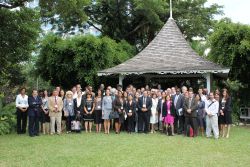UNEP/CMS Participates in the Fifth Pan-American Meeting of the Convention on Wetlands

Bonn, 14 December 2011 - UNEP/CMS participated
in the Fifth Pan-American meeting of the Convention on Wetlands
held in Kingston, Jamaica from 6-10 December 2011. Hosted
by the Ministry of Housing, Environment and Water and the
National Environment and Planning Agency-NEPA, the meeting
focused mainly on issues to be addressed by the 11th Conference
of the Parties (COP11) to the Ramsar Convention to be held
in Bucharest, Rumania, 6-13 July 2012. Also discussed were
the evaluation of the Regional Strategy for the Americas
and the implementation of associated projects. CMS Information
and Capacity-Building Officer, Francisco Rilla, was one
of more than fifty delegates from parties, NGOs and MEAs
who participated in the meeting.
The meeting provided an important opportunity to assess
the progress made in the implementation in the Americas
of the Ramsar Convention’s Strategic Plan 2009-2015
and review experiences in the region regarding the achievement
of the commitments agreed to by the Contracting Parties
to the Convention during the last triennium.
One of the most important topics discussed were Wetlands,
migratory species and Climate Change. The Parties stated
that it was important to have guidelines on the type of
wetlands that were most vulnerable to climate change and
the measures to protect these ecosystems, as well as to
strengthen the work with other Conventions, mainly UNFCCC
on climate change and CMS with regard to migratory species.
Another topic highlighted during the workshop was the implications
of climate change for the High Andean region. As the melting
of glaciers is progressing rapidly, all stakeholders, ranging
from political decision-makers to local communities need
to act and respond to the new challenge.
The Ramsar Convention has a close relationship with other
MEAs, particularly with UNEP/CMS and AEWA which are considered
to be very important partners, and their presence at this
meeting was welcomed, in light of the need for active interaction
involving National Reports, Protected Areas, regional initiatives,
local communities, wetland user groups and institutions,
among others.
[more
information on the Ramsar website]
Last updated on 16 June 2014


